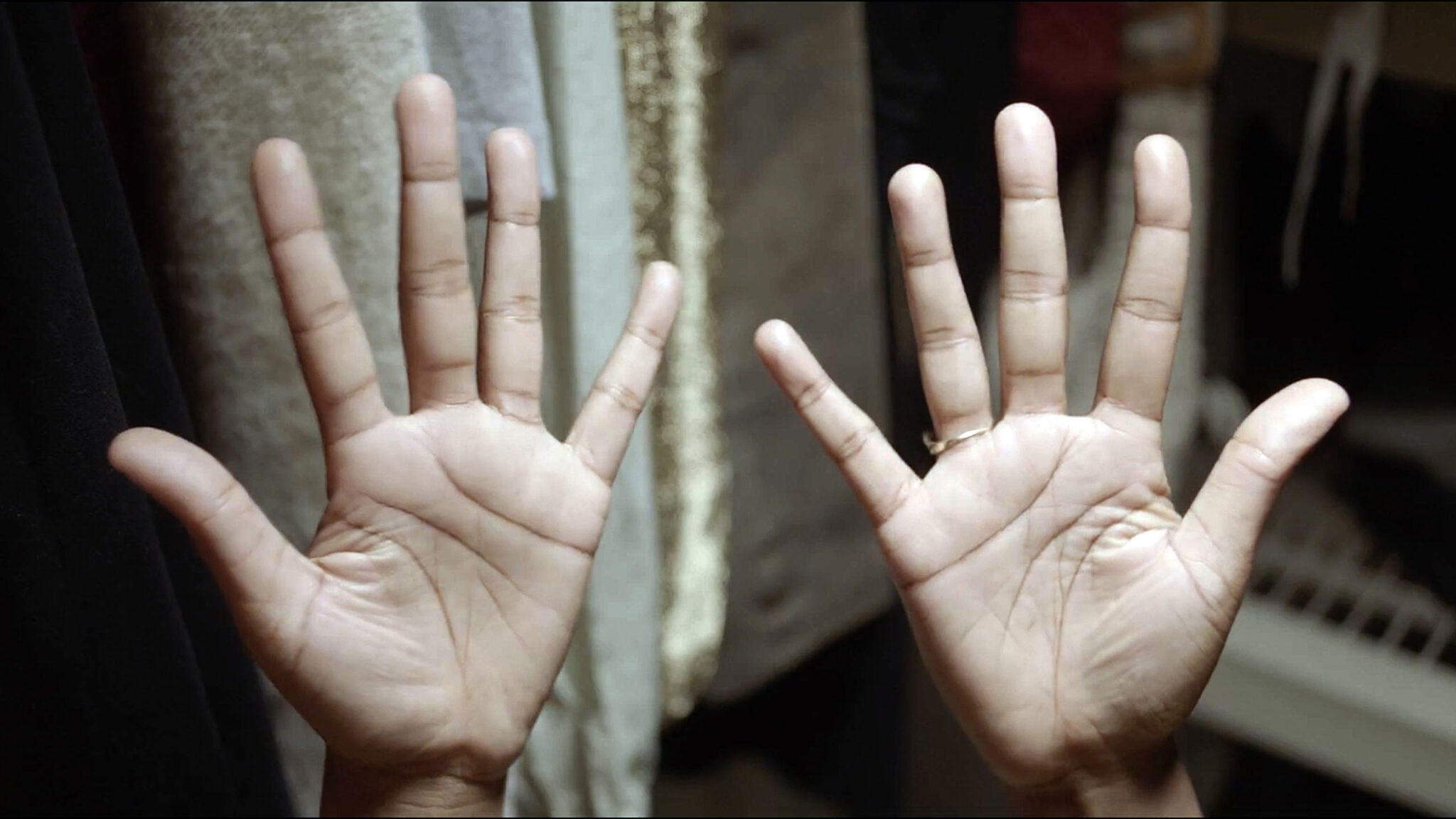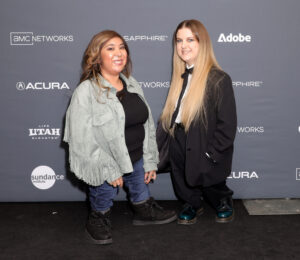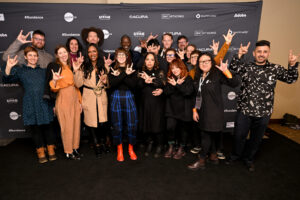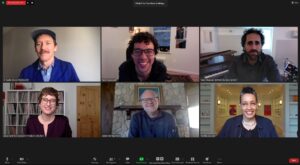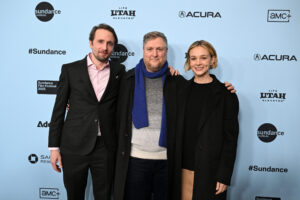By Stephanie Ornelas
For years, independent filmmakers with disabilities have welcomed audiences into their personal narratives. They’ve worked to gain agency and bring authentic and artful representation to their communities. Film Festival attendees and audiences around the world have experienced the joy and struggles of disabled people thanks to artists like Reid Davenport, Ella Glendining, Jennifer Brea, and more.
Now, as part of our Doctober programming, we’re highlighting some outstanding projects from bold filmmakers who are sharing their stories of living with a disability.
“At the end of high school and throughout college, I really fit in. But there was a void in my confidence still — a sense that I didn’t quite grasp how the world saw my disability and how it affected my life,” said Reid Davenport (I Didn’t See You There, 2022) during a TED Talk in 2017. “My discovery of documentary filmmaking was not only a discovery of self-expression, but a way to intellectually place myself and my world.” Today, Davenport is an award-winning documentary filmmaker and the recipient of the Directing Award for U.S. Documentary at the 2022 Sundance Film Festival.
Sundance Institute has a long history of championing nonfiction filmmakers with disabilities and their stories through the DFP and the Sundance Film Festival. Cinema is an incredibly powerful tool to drive change, and such projects are paving the way to a more inclusive and accessible film industry.
Take a moment and explore these seven influential documentaries brought to life with support from the Documentary Film Program, and read what some of our DFP staff members have to say about these remarkable films:
Crip Camp (2020)
Director(s): Jim LeBrecht, Nicole Newnham
Producer(s): Sara Bolder, James LeBrecht, Nicole Newnham
Logline: A groundbreaking summer camp galvanizes a group of teens with disabilities to help build a movement, forging a new path toward greater equality. Crip Camp received support through the 2018 Documentary Edit and Story Lab and a Sundance Documentary Film Grant in 2017.

“Nominated for an Oscar in 2021, Crip Camp is a beautifully crafted story that centers the origins of the American disability rights movement, some of the roots of which can be traced to the 1970s at a summer camp in the Catskills for disabled youth,” says Interim Director, Documentary Film and Artist Programs, Kristin Feeley. “The film interweaves the stories of co-director Jim LeBrecht and several key figures in the movement, including the late trailblazing activist Judy Heumann. The film evokes the joy of youth, bonds of friendship, and the liberatory power a truly inclusive experience can inspire.”
Check here for viewing options.
Fire Through Dry Grass (2023)
Director(s): Alexis Neophytides, Andres “Jay” Molina
Producer(s): Jennilie Brewster, Alexis Neophytides
Logline: On a tiny island in NYC, artists of color with disabilities fight COVID-19 — and the city — to protect the lives of 500 vulnerable nursing home residents. In 2022, Neophytides was a recipient of the Sundance Institute | Sandbox Fund.
“Having recently premiered at the 2023 BlackStar Film Festival, Fire Through Dry Grass offers a timely look at the consistent institutional neglect of society’s most vulnerable in the wake of the COVID-19 pandemic,” says Andrea Alarcon, manager, producing and artist support. “We move through the film with the Reality Poets, a group of disabled artists of color, who are nursing home residents living on Roosevelt Island — a place historically used to contain marginalized and unwanted communities in New York. As they live through deplorable conditions during the height of the pandemic, the Reality Poets use their raw firsthand footage to demonstrate their art as activism, collective power, and consistent action to create radical change.”
Check here for viewing options.
I Didn’t See You There (2022)
Director: Reid Davenport
Producer: Keith Wilson
Logline: Spurred by the spectacle of a circus tent that goes up outside his Oakland apartment, a filmmaker launches into an unflinching meditation on freakdom, (in)visibility, and the pursuit of individual agency. Shot entirely from his literal physical perspective — both from his wheelchair and his two feet — the filmmaker’s gaze and thoughts oscillate between how he is seen, his distant family, and whether his films have fallen into the legacy of the freak show. I Didn’t See You There is a 2021 Documentary Fund and Creative Producing Documentary Lab supported project.
“With full command of its poetic form, I Didn’t See You There director Reid Davenport takes the viewer on a poignant personal journey traversing rage and gaze of and within the disabled community.” says Kat Schulze, program coordinator. “From its enveloping narration and captivating imagery from Reid, expertly strung together by editor Todd Chandler; to the meaningful connection with audiences led by the team including 2021 Documentary Producers Lab fellow Keith Wilson, this is impeccable filmmaking to experience again and again.”
Available to watch on PBS.
The Tuba Thieves (2023)
Director: Alison O’Daniel
Producer(s): Rachel Nederveld, Su Kim, Maya E. Rudolph
Logline: From 2011 to 2013, a rash of tuba thefts occurred from high schools across Southern California. The Tuba Thieves does not tell the story of the thieves or the missing tubas. Instead, it asks what it means to listen. Producer Rachel Nederveld was a fellow for the 2019 Creative Producing Documentary Lab.
“It is rare when a film irrevocably changes the way you perceive yourself and the world around you,” says Evan Neff, coordinator, Documentary Fund. “The Tuba Thieves is one such entry, weaving documentary threads with fictional interludes to demonstrate how sound and its absence shapes where we live, who we love, what we believe, and who we choose to be in the world. Alison O’Daniel’s assured and distinctive writing and direction serve as a wake-up call to sit up and listen.”
Check here for viewing options.
Unrest (2017)
Director: Jennifer Brea
Producer(s): Jennifer Brea, Lindsey Dryden, Patricia E. Gillespie, Alysa Nahmias
Logline: Jennifer Brea is about to marry the love of her life when she’s struck down by a fever that leaves her bedridden. When doctors tell her it’s all in her head, she turns her camera on herself as she looks for answers and fights for a cure. Brea was a fellow for the Documentary Edit and Story Lab in 2016 and received a Sundance Documentary Film Grant in 2014.
“This Oscar-shortlisted, transcendent personal story explores Jennifer Brea’s journey through Myalgic Encephalomyelitis (ME), from patient to advocate to storyteller. ME, more commonly known as Chronic Fatigue Syndrome, has affected an estimated 15-30 million people worldwide yet research and funding for a cure remain inadequate,” says Feeley. “First-time filmmaker Jen Brea shares her experiences on camera and connects with others who are both suffering from ME and fighting for their right to adequate care. The film balances telling a nuanced story of a complicated and elusive disease and search for a cure, with a moving love story that will inspire you to take action.”
Check here for viewing options.
Unseen (2021)
Director: Set Hernandez Rongkilyo
Producer(s): Set Hernandez Rongkilyo, Day Al-Mohamed, Félix Endara
Logline: Unseen is a multi-platform documentary project that follows the story of Pedro, an undocumented immigrant and aspiring social worker who happens to be blind. The film uses Pedro’s professional pursuits as the backdrop for his personal journey around mental health and the political reality he faces in the United States, illuminating the struggles rendered invisible by an anti-immigrant, ableist nation. Using diegetic sound and experimental cinematography, the audio-based film portrays the point-of-view of a protagonist who is blind to reimagine the accessibility of cinema for audience members who cannot see. Beyond the film, the project also has an audio play and immersive VR component to make the film as accessible as possible for audiences with disabilities. Rongkilyo received support from the Documentary Film Program in 2021 through a Sundance Institute Documentary Film Grant.
“Embracing an experimental visual approach, Unseen follows the journey of Pedro, who’s carving out his path to become a social worker. As he grapples with lack of access and political barriers to get there, the film delicately moves us through the intersections of disability, immigration, family, and mental health,” Alarcon says. “It is a unique viewing experience in which the fluid intimacy and mutual respect between filmmaker and protagonist is absolutely palpable on screen. The film provokes a visceral reimagining of what it means to make cinema accessible, and you will walk away with a new perspective.”
Check here for viewing options.
When I Walk (2013)
Director: Jason DaSilva
Producer(s): Alice Cook, Jason DaSilva
Logline: Jason DaSilva was 25 years old and a rising independent filmmaker when a diagnosis of multiple sclerosis changed everything — and inspired him to make another film. When I Walk is a candid and brave chronicle of one young man’s struggle to adapt to the harsh realities of M.S. while holding on to his personal and creative life. In 2011, DaSilva received a Documentary Film Grant to help bring his film to life.
“A beautiful and intimate blend of humor, sensitivity, and catharsis — Jason DaSilva’s When I Walk invites the viewer to join him on his journey of the unexpected. Alongside DaSilva, one is reminded that life cannot be planned and it is in the uncertainty we find a way forward,” explains Schulze.
Check here for viewing options.
Interested in exploring more films created by artists living with a disability? Check out this 2023 Sundance Film Festival premiere: Is There Anybody Out There?
Director: Ella Glendining
Producer: Janine Marmot
Logline: This groundbreaking documentary follows filmmaker Ella Glendining’s global search for someone with a body that looks like hers. The film explores what it takes to love yourself fiercely as a disabled person in an ableist world.
Check here for viewing options.
To learn more about how you can champion authentic disabled stories, explore A Toolkit for Inclusion & Accessibility: Changing the Narrative of Disability created by FWD-Doc in association with Doc Society and supported by Netflix. Organizations like FWD-Doc have been instrumental in creating a community for filmmakers with disabilities. They’ve established recommendations and resources that can be utilized to make both the filmmaking process and the experience for audiences more accessible.
Film Accessibility Working Group is another organization working to increase accessibility within film event spaces. Its members, some from Sundance Institute, work to provide accessibility guidelines for film festivals and public events, ensuring that feedback from audience members is heard.

